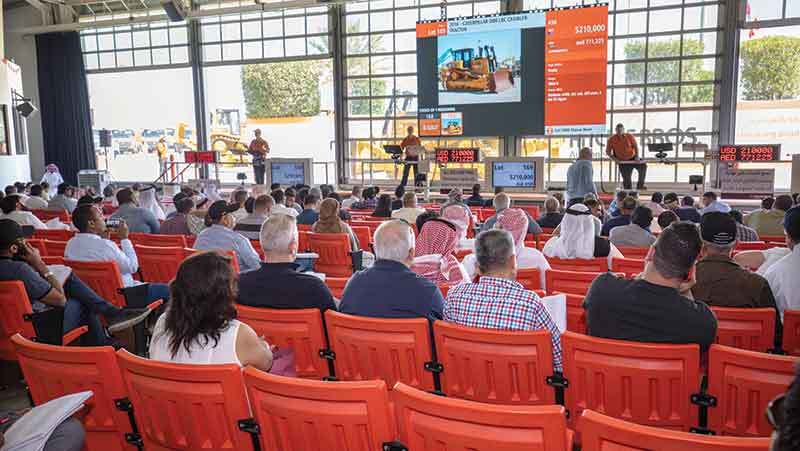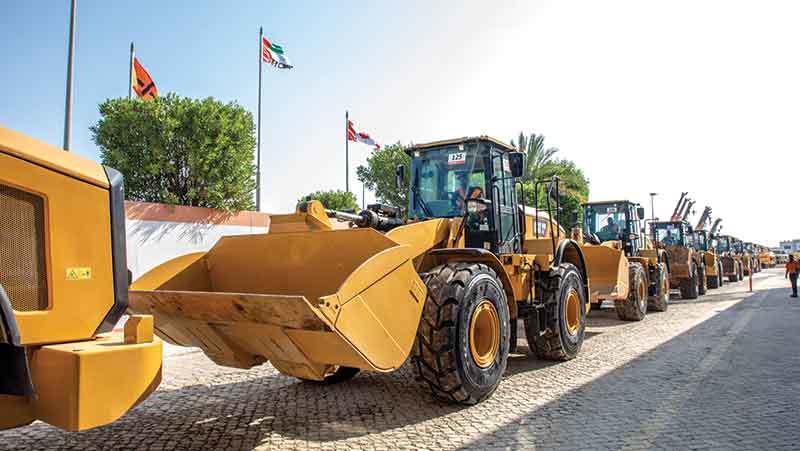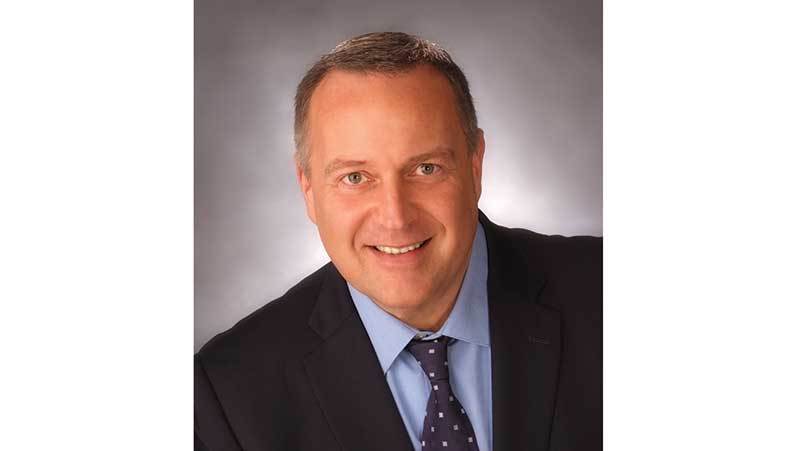Growing The Marketplace
Keywords: No Keys
Tags: Ritchie Bros.
Karl Werner, the man in charge of Ritchie Bros.’ international operations, talks with P&E about the progression to multichannel and the global trends affecting used machinery sales.

In the world of used equipment auctions, Ritchie Bros. Auctioneers is an undisputed titan, selling $3.76bn of equipment in the first three quarters of 2019, up 4% from the same period in 2018, with nearly $5bn of gross transactional value (GTV) sold across all of 2018. It’s a figure that covers everything from huge pieces of mining equipment, to mid-sized construction machinery, trucks and vehicles, down to smaller pieces of plant such as gensets - as anyone who has visited its well-stocked yard at its Dubai auction centre in the Jebel Ali Free Zone well knows.
That site is the company’s hub for not only the Middle East but also Africa and India. The auctioneer holds on average four auctions a year in Dubai, says Karl Werner, the company’s President, International, who visited Dubai for the December 2019 year-end sale. Apart from visitors from Dubai and the surrounding emirates, the site sees major visitor footfall from Saudi Arabia, Jordan, Egypt and Oman.
Werner knows the details inside out. A 20-year company veteran who started his career in sales, he became Head of the Middle East business in 2014, before being promoted to President, International in 2017. In August 2019 he was appointed as Interim Co-CEO with the departure of Ravi Saligram, a position he held until the appointment of the company’s new CEO, Ann Fandozzi, on January 6 this year.
Saligram’s five-year reign saw the company transform itself with new sales channels and the acquisition of IronPlanet, a global auctioneer whose business was built largely around an online sales model. Purchased for around $759m, the acquisition was completed in 2017. Werner says Ritchie Bros. has “transitioned from an auction company to a multichannel disposition platform with multiple, powerful ways to sell and buy”.
“The live events still create a unique ‘event’ dynamic in the market where buyers and sellers can see current market conditions in real time and catch up with their colleagues in the industry.”
That includes Marketplace-E, a new 24/7 ‘always-on’ marketplace which launched in January 2019 and has already cumulatively surpassed the $500m mark in GTV, said Werner in December in an interview with Plant & Equipment: “Marketplace-E has a lot of momentum right now and has been fully embraced by our sales teams globally as another capability to serve their customers’ needs, particularly those seeking more control or who prefer a reserved platform.”
The new sales channel is also attracting an entirely new set of customers, he says. “Through our customer data, we are seeing that over 50% of the sellers on MPE in the last year have been new sellers to RBA or IronPlanet, so it is driving incremental new business. Not only sellers, but equipment buyers love that they now have different ways of finding and purchasing equipment as well.”
There are also tangential benefits to online sales, including secrecy. And while it’s not important for everyone, if a dealer or broker wants to remain hidden they can use an online channel to confidentially bid on kit.

Offering machinery to larger groups of buyers should help achieve the best price for the item.
Nevertheless, Werner says the online sales haven’t subtracted from attendance at the live auctions. “At many auctions throughout the world in 2019 we have had record on-site crowds. Our online channels are complementary to our live events. In many cases the online channels cater to different customers with different requirements, and sometimes the same customers with different types of assets to sell. Overall, however, the live events still create a unique ‘event’ dynamic in the market where buyers and sellers can see current market conditions in real time and catch up with their colleagues in the industry.”
“Globally we are seeing OEMs scale back production to match lower demand for new machines. This means dealer inventories are increasing.”
Another buyer-friendly tool recently introduced for the live auctions is PriorityBid, which allows customers to place an online proxy bid up to a week before the event. “PriorityBid was previously already in use on IronPlanet, and will give customers a more consistent experience across our platforms and allow them a bigger window to place bids more often,” says Werner, noting that it also gives the company insights into how items and categories are performing before the live auction.
Fandozzi, the incoming CEO, was most recently the CEO of ABRA Auto Body & Glass, a leading American damaged vehicle repair company, where she engineered a step-change in profitability and laid the foundation for an all-new customer experience through technology.
“I am honoured and excited to lead Ritchie Bros. at an important time in the company’s history,” said Fandozzi in a press release announcing her appointment.
Global outlook
This comes as manufacturers are seeing weaker demand for new machines, a business trend that will in turn have flow-on effects for used equipment sales, with Ritchie Bros. seen as an important barometer when it comes to measuring the overall health of the industry.
“Globally we are seeing OEMs scale back production to match lower demand for new machines. This means dealer inventories are increasing. Through our auctions and marketplaces we continue to see good demand and pricing for late-model, low-hour construction and transportation assets,” says Werner.
Used equipment sales can also be bolstered by economic turbulence or uncertainty, says Werner. “In these cycles there is still lots of work going on in the world. However, historically when we go into cycles of lower demand, plant managers and owners tend to lean towards used versus new purchases to fill short-term project needs. For example, if you have a six-month project and no additional projects currently on the horizon, you may prefer to purchase used machines. If you have three years of work lined up, you may consider new.”
Much of the new machinery being sold today is also more technologically complex, and as OEMs iterate many machines with advanced tech are also coming into the second-hand market, something which can affect machinery flows. “Certainly, developing countries have less ability to support and maintain more complex machines. Product support can be challenging in some areas of the world, which affects where these machines can be marketed to,” says Werner.
The biggest division in the used equipment world is undoubtedly between engine types, and whether a country has the low-sulphur diesel needed for an engine that meets the highest emission control standards. Most of the Middle East still runs on relatively high-sulphur diesel, though the UAE stands out as one country mandating the use of ultra-low sulphur diesel.

Karl Werner, the man in charge of Ritchie Bros.’ international operations.
Werner notes that the firm is seeing enhanced emission regulations around the world. “The introduction of low-sulphur diesel fuel in the UAE will improve market opportunities locally. [However] the UAE is a major trading and distribution hub for the GCC, Southeast Asia and Africa, so Tier 2/3 equipment will continue to have a strong buyer base here.”
Leveraging data for better sales prices
For fleet owners, ensuring they can get top dollar for their used equipment or even their entire fleet when it comes to dispersals can make a significant difference to profits. Werner says that apart from the auction format, Ritchie Bros. now has multiple channels to buy and sell equipment that fits a customer’s needs.
“We use data and technology to help business owners and fleet managers make smart decisions, like: What is the best time to sell in the market? Where and how can the best possible returns be achieved? Our global network and data give us insights that benefit our customers and help them run their businesses.”
That includes Ritchie Bros. Asset Solutions, a fleet management tool that allows fleet managers to leverage RB data, platforms and insights to maximise return on investment, says Werner. The product is in use in the Middle East, with at least one customer in Saudi Arabia.
Technology will no doubt continue to influence how markets places evolve, whether in consumer goods or used equipment. Werner notes that Ritchie Bros. has been an innovator since its founding in 1958.
“There have been so many big and small developments that have changed how we can buy and sell equipment, from the first Ritchie Bros. website, live online bidding through our website, Virtual Ramp, timed auction lots for smaller items, an incredibly successful mobile app - all the way up to the Mascus and IronPlanet acquisitions that enabled us to combine technologies, such as Ritchie Bros. Asset Solutions, that are taking our business to the next level.”
Videos
Bobcat EMEA Launches The New Generation R-Series B730 Backhoe Loader For The Middle East And Africa
Al Qahtani Vehicle & Machinery Showcasing LuiGong Machines In Saudi Arabia
Masaha Global Is Offering The Luxurious & Eagle Eye Shaped Foton Aumark Super Truck

 Construction Equipment
Construction Equipment
 Cranes
Cranes
 Material Handling
Material Handling
 Trucks & Trailers
Trucks & Trailers
 Vehicles
Vehicles
 Agricultural Equipment
Agricultural Equipment
 Live Auctions
Live Auctions
















